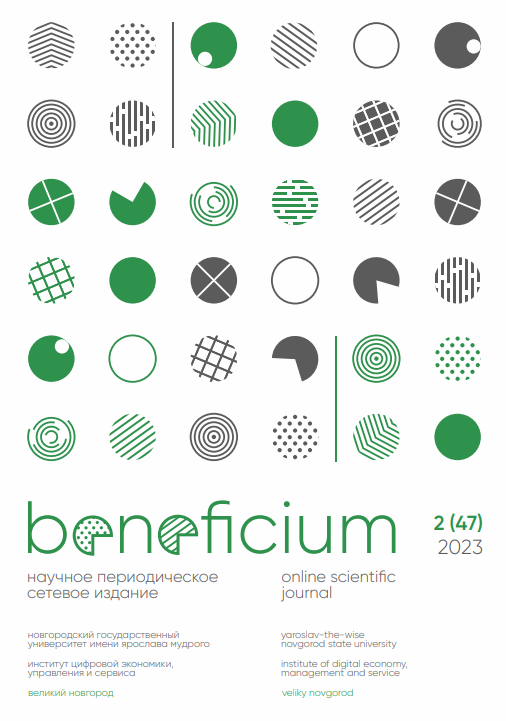INVOLVING STAFF IN THE IMPLEMENTATION OF THE ENVIRONMENTAL PROTECTION CONCEPT
Abstract
Companies with active environmental policies are facing the need for a fundamental change in their personal management system because employees and their behaviour, not just technology alone, are the carriers of environmental progress. The aim of the study was to determine how staff could be involved in the implementation of corporate environmental objectives. In order to achieve the purpose of the study, a survey (in the form of a questionnaire) was conducted among 358 employees of German construction companies, corresponding to a survey rate of 23.9%. According to the general hypothesis of the study, staff motivation to contribute to environmental protection in the workplace is currently not very high. However, the results of processing respondents' answers to a range of questions showed that many employees are already oriented towards sustainability in their everyday life at home and are also motivated to behave environmentally at the workplace. Greening is particularly marked among employees in the older age group, as well as at management level; in contrast, the lowest level of engagement in improving sustainability is found in the under-20 age group and among trainees. Employees of companies play an important role in implementing corporate environmental objectives. At the management level, it is necessary to convey the need to introduce an environmental management system to the employees in a clear and understandable way, to motivate employees to offer environmental initiatives and to comply with them, and to monitor the implementation of environmental policies by key company departments.
Keywords: employee engagement, sustainable development, environmental management, environmental protection, greening
References
- Habibi-Kohlen D. Zur zeitbedingten Abwehr der Klimakrise. In: Climate Action – Psychologie der Klimakrise. Gießen: Psychosozial-Verlag, 2021. Pp. 45-64. (In Germ.).
- Klimaschutz-Göttingen e.V. (2020). Zitate der Woche aus 2020. (In Germ.). URL: https://klimaschutz-goettingen.de/zitat-der-woche-2020/ (accessed on 22.03.2023).
- Dohm L., Peter F., Van Bronswijk K. Mit “Climate Action” aus der Klimakrise. In: Climate Action – Psychologie der Klimakrise. Gießen: Psychosozial-Verlag, 2021. Pp. 13-20. (In Germ.).
- Dohm L. Über das Bewusstsein der Klimakrise. In: Climate Action – Psychologie der Klimakrise. Gießen: Psychosozial-Verlag, 2021. Pp. 29-41. (In Germ.).
- Levi S., Müller-Hansen F., Lamb W. [et al.]. Klimaschutz-Ausreden. In: Climate Action – Psychologie der Klimakrise. Gießen: Psychosozial-Verlag, 2021. Pp. 89-104. (In Germ.).
- Lamb W.F., Mattioli G., Levi S. [et al.]. Discourses of climate delay // Global Sustainability. 2020. Vol. 3. Pp. 1-5. DOI: 10.1017/sus.2020.13
- Gifford R. The dragons of inaction: Psychological barriers that limit climate change mitigation and adaptation // American Psychologist. 2011. Vol. 66. Pp. 290-302. DOI: 10.1037/a0023566
- Salmon E., Preston J.L., Tannenbaum M.B. Climate change helplessness and the (de)moralization of individual energy behavior // Journal of Experimental Psychology Applied. 2017. Vol. 23(1). Pp. 15-23. DOI: 10.1037/xap0000105
- Fritsche I., Barth M., Reese G. Klimaschutz als kollektives Handeln – Die psychologische Forschung zur Rolle sozialer Identität. In: Climate Action – Psychologie der Klimakrise. Gießen: Psychosozial-Verlag, 2021. Pp. 229-250. (In Germ.).
- Beyerl K. Was motiviert zu nachhaltigem Handeln? – Perspektiven aus der umweltpsychologisch-transdisziplinären Praxis. In: Climate Action – Psychologie der Klimakrise. Gießen: Psychosozial-Verlag, 2021. Pp. 355-370. (In Germ.).
- Junge Menschen zur Klimakrise. (2021). zdf.heute. (In Germ.). URL: https://www.zdf.de/nachrichten/panorama/klimakrise-angst-kinder-jugendliche-studie-100.html (accessed on 22.03.2023).
- Hansel M., Link G., Krüger C. [et al.]. Akteure im kommunalen Klimaschutz erfolgreich beteiligen. Berlin: Service- und Kompetenzzentrum, 2017. (In Germ.).
- Definition Likert Skala. (2021) Statista. (In Germ.). URL: https://de.statista.com/statistik/lexikon/definition/82/likert_skala/ (accessed on 23.03.2023).
- Genutzte Verkehrsmittel von Berufspendlern in Deutschland im Jahr 2020. (2021) Statista. (In Germ.). URL: https://de.statista.com/statistik/daten/studie/70408/umfrage/pendler-fuer-arbeitsweg-benutzte-verkehrsmittel-2008/ (accessed on 23.03.2023).
- Umfrage in Deutschland zum Interesse an Naturschutz und Umweltschutz bis 2021. (2021). Statista (In Germ.). URL: https://de.statista.com/statistik/daten/studie/170945/umfrage/interesse-an-naturschutz-und-umweltschutz/ (accessed on 23.03.2023).
- Nachhaltiger Konsum in Deutschland 2021 Report. (2021). Statista. (In Germ.). URL: https://de.statista.com/statistik/studie/id/88296/dokument/nachhaltiger-konsum-report/ (accessed on 23.03.2023).
- Umweltbewusstsein in Deutschland. (2021). Umweltbundesamt. (In Germ.). URL: https://www.umweltbundesamt.de/themen/nachhaltigkeit-strategien-internationales/umweltbewusstsein-in-deutschland (accessed on 22.03.2023).
- Umweltbewusstsein und Umweltverhalten. (2021). Umweltbundesamt. (In Germ.). URL: https://www.umweltbundesamt.de/daten/private-haushalte-konsum/umweltbewusstsein-umweltverhalten#das-umweltbewusstsein-in-deutschland (accessed on 22.03.2023).
- Hinz O. Welches Anreizsystem motiviert Mitarbeiter am stärksten? (2020). Business-wissen.de. (In Germ.). URL: https://www.business-wissen.de/artikel/anreizsysteme-was-motiviert-mitarbeiter-am-staerksten/ (accessed on 24.03.2023).
- Umfrage zum Thema Lebensmittelkauf und Essen in Deutschland im Jahr 2019. (2020). Statista. (In Germ.). URL: https://de.statista.com/statistik/daten/studie/1130183/umfrage/essen-lebensmittelkauf-umfrage-deutschland/ (accessed on 23.03.2023).
- Umfrage zur Motivation der Kunden von Unverpackt-Läden. (2020). Statista. (In Germ.). URL: https://de.statista.com/statistik/daten/studie/1155817/umfrage/umfrage-zur-motivation-der-kunden-von-unverpackt-laeden/ (accessed on 23.03.2023).
- Scheibengraf M., Reisinger H. Abfallvermeidung und -verwertung: Baurestmassen. Wien: Umweltbundesamt GmbH, 2005. (In Germ.).
- Voraussetzungen für den Umstieg vom PKW auf den ÖPNV in Deutschland in 2017. (2017). Statista. (In Germ.). URL: https://de.statista.com/statistik/daten/studie/892631/umfrage/voraussetzungen-fuer-den-umstieg-vom-pkw-auf-den-oepnv-in-deutschland/ (accessed on 22.03.2023).
- Umfrage zu Gründen gegen die Nutzung des ÖPNV in Deutschland in 2017. (2017). Statista. (In Germ.). URL: https://de.statista.com/statistik/daten/studie/892573/umfrage/umfrage-zu-gruenden-gegen-die-nutzung-des-oepnv-in-deutschland/ (accessed on 22.03.2023).
About the Authors
Kristin Gottlieb – Master of Arts, International School of Management, Frankfurt am Main, Germany. E-mail: Kristin.Gottlieb97@gmail.com
Patrick Siegfried– Dr. Sci. (Economics), Professor; Professor, International School of Management, Frankfurt am Main, Germany. E-mail: patrick.siegfried@ism.de. ORCID 0000-0001-6783-4518. ResearcherID ACS-6325-2022
Otto Jockel – Dr. Sci. (Economics), Professor; Professor, International School of Management, Cologne, Germany. E-mail: otto.jockel@ism.de. ORCID 0009-0002-3856-471X
For citation: Gottlieb K., Siegfried P., Jockel O. Einbindung der Mitarbeiter Der Organisation in die Umsetzung des Umwelt- und Klimaschutzkonzeptes // BENEFICIUM. 2023. Vol. 2(47). Pp. 89-99. (In Germ.). DOI: 10.34680/BENEFICIUM.2023.2(47).89-99









